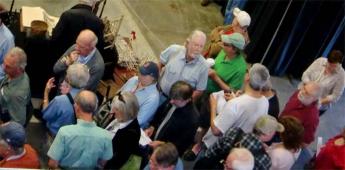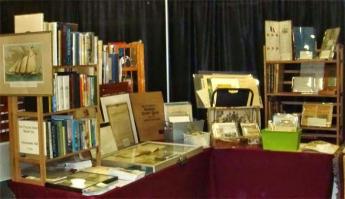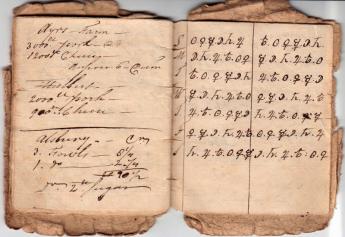Antiquarian Booksellers' Association of America Ten Pound Island Book Company
The Rare Book Trade Transhumance

By Greg Gibson
What could be more mysterious than the irresistible signals sent by the turning of the seasons? Now the days lengthen as the sun proceeds toward its summer destiny. The lilac has come into bloom and faded. The shad bush has leafed out. Alewives struggle upstream, and elvers wriggle down to the sea. The IRS has been paid, the soldiers honored, and the peas planted. Like a salamander crawling out of the muck, I obey nature's call and head north – part of a transhumance that has been taking place since the beginning of bookseller chronicles. It's time for another New Hampshire book fair.
Pull the books, load the car, steer down route 128, stopping at Fast Freddie's to solemnly anoint myself with 87 octane and a medium light with sugar. Southward to route 93. Then north through wilderness to the citadel known as the State Liquor Store where sufficient fuel is taken on board to complete the week's journey. Exit at 14, and up 9 (12893149... What universal secrets are coded in these numbers?) for a ritual ham and swiss with mustard, mayo, hot peppers, and pickles, then down the Great Hill to the place my people gather, as they have without change each year forever.
But wait.
Something is different ...
Curtains!
In another innovative stroke the ever inventive Marvin Getman of New England Antique Shows has introduced pipes and drapes to the venerable New Hampshire Book Fair. Black drapes.
Bloviation aside, this event has its origins deep in the mists of the past. Back in the early 1980s there was only one book fair in all of creation – the NHABA event held each autumn at a rambling, seedy venue called the Highway Hotel.
Because it was the only game going, this book fair was perpetually oversubscribed. Young book dealer John Hendsey, something of an innovator himself, saw his opportunity and started a second book fair at the Highway Hotel that took place six months later, in the spring.
Initially, he faced harsh criticism from the conservative element in our trade for “stealing” the concept of book fairs. But the immediate success of Hendsey's venture silenced those critics. Following the sale and demolition of the Highway Hotel (its owners had been trying to dump the joint for years, which explained the cheap rent and worn out AstroTurf carpets) the resourceful Hendsey moved his show to the Everett Arena – home, at the time, of the Budmen, a minor minor ("senior amateur") league hockey team. In fact, I believe the first book fair in that venue was held on the ice. At least it felt that way.
Eventually, however, Hendsey tired of the administrative responsibilities and of having to speak to other humans. Repeatedly. He enlisted a very able helper named Laura P(B)arr, to whom he subsequently sold the show. Then, for years after, Laura (B)Parr ran the spring show in the Everett Arena. I mean years. It was so long ago that my father would come up to visit and we'd have lunch in the picnic area behind the arena. Now I'm older than he was. Or that's what it still feels like.
Bad enough. But worse, over this period, through no fault of her own, the New Hampshire book fair declined, as shows in general declined in a shocking manner. Recently, the autumn version of the New Hampshire show (direct descendant of the first Highway Hotel affair) was canceled due to lack of support from New Hampshire dealers themselves. Shameful! Finally, last year, Laura pulled the plug on her spring show because not enough dealers had signed up in advance, and she did not want to take on the financial risk of renting the venue. It was the darkest hour of the New Hampshire book fair.
Enter Marvin Getman, who bought the show from Laura (B)Parr, and erected curtains.
Not only that, he leavened the crowd of sagging book dealers by adding a row of people who were In the business of selling, or trying to sell, what are charitably referred to as “antiques.”
Nomenclature aside, this addition brought the crowds in. Despite the brilliant spring weather, this book/antique/ephemera fair welcomed the biggest, liveliest flock of patrons it had seen in years.
Nor did it hurt that Getman spent some money on advertising. Four newspapers and the local NPR outlet. What will he think of next?
I'm happy to report that Marvin's efforts yielded salutory results, with most dealers reporting sales.
Ten Pound Island Book Co. had an excellent day, selling three books for a total of $45 (average ticket $15). Although the four and five figure books and manuscripts on display were generally met with incomprehension, items in the lower register found a healthy reception. The sweet spot seemed to be between $5 and $15 (one and two figure items, for those of you who are keeping track).
The buying was only so-so, but lunch at the new Mexican place across Loudon Rd. hit the spot. Rather than tell you anything more about rice and beans, here's a nifty item I bought in the parking lot before the show opened.
Memorandum Book, March - December, 1777. 16mo. 40 pages of manuscript entries.
This book records payments made and received, notes of things accomplished, reminders of things to be done, tallies of goods received and sent out, and similar notations - a sort of palm pilot of its time. Other contents include the floor plan of a house, a double page list of "Surinam cargo recd." including payments received from C. Ellery and Jos. Rogers. The anonymous keeper of this record must also have been involved in real estate, since he mentions "Cash paid John Ayers for his farm," and farms and houses in Norwich and Colchester as well as maps of Connecticut and "Pittsfield, Berkshire county." Most of the other transactions involve such items as molasses, sugar, wheat, and other agricultural products. He mentions arrangements whereby tenants pay in produce at a certain percentage of cash value and, perhaps most interestingly, the purchase from Nathan Gardner of "negro Wom" and "negro." Toward the end of the book is a table of what appear to be astrological symbols corresponding to days of the week. An interesting, if somewhat enigmatic, look at the activities of an American merchant of the Revolutionary era. In plain wraps. $500
***
Posted on Bookman’s Log, presented here by permission of the author. Pictures: Bookman’s Log.




